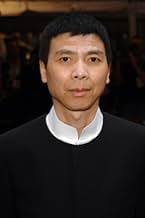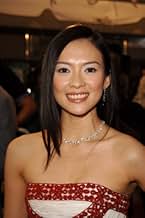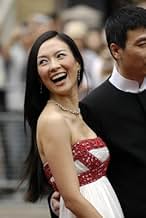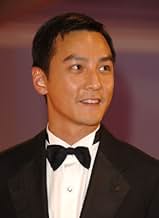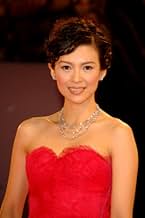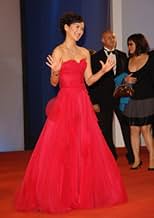IMDb RATING
6.4/10
7.3K
YOUR RATING
A loose adaptation of Hamlet, "The Night Banquet" is set in an empire in chaos. The Emperor, the Empress, the Crown Prince, the Minister and the General all have their own enemies they would... Read allA loose adaptation of Hamlet, "The Night Banquet" is set in an empire in chaos. The Emperor, the Empress, the Crown Prince, the Minister and the General all have their own enemies they would like to finish off at a night banquet.A loose adaptation of Hamlet, "The Night Banquet" is set in an empire in chaos. The Emperor, the Empress, the Crown Prince, the Minister and the General all have their own enemies they would like to finish off at a night banquet.
- Awards
- 10 wins & 25 nominations total
Yanbin Liu
- Messenger
- (as Liu Yanbin)
- Director
- Writers
- All cast & crew
- Production, box office & more at IMDbPro
Featured reviews
The women' death is because of the love.
The men' death is because of the women.
Desire is the measure, is the excuse.
Finally, desire is defeated to the love and the death.
In this war, the winner is
Beautiful clothes, lovely music and song, strange marks, tragedy character, moving story. It shows you that what Chinese' value is, what the love is, what the human' heart is. You will think deeply from your heart, you may understand the different among the cultures to express the familiar story. Think about Hamlet.
People don't understand each other, if they do, there is no one alone.
The men' death is because of the women.
Desire is the measure, is the excuse.
Finally, desire is defeated to the love and the death.
In this war, the winner is
Beautiful clothes, lovely music and song, strange marks, tragedy character, moving story. It shows you that what Chinese' value is, what the love is, what the human' heart is. You will think deeply from your heart, you may understand the different among the cultures to express the familiar story. Think about Hamlet.
People don't understand each other, if they do, there is no one alone.
Definitely worth catching on the BIG screen, this is an epic about court intrigue in the Five Dynasties period, which follows in part the Hamlet setup of a murderous uncle usurper (You Ge) and his duplicitous queen (Zhang Ziyi), with an angry yet distant, brooding prince (Daniel Wu). The details and setting are different enough so that the new story carries its own weight and is interesting, however. The acting is strong (some excellent), the martial arts scenes memorable, and the sets are fantastic! This is not a fully realistic historical drama, by the way. Director Xiaogang Feng has crafted a modern art piece here, highly stylized in some parts, and often gory, especially the martial arts scenes, so if you can't stomach people flying and leaping like phoenixes (while disemboweling each other), skip it. The highly artistic feel of the film is kept somewhat in check by the gritty, used, and sometimes decaying feel of the palace, and more so by the tight, sparse dialog, the drama and the tension of the story. (Although following in the footsteps of highly stylized films like some of Zhang Yimou's, the focus returns very firmly to the story in this one, thankfully.) Similarly, the stunning beauty of parts of the film is balanced by the unmitigated ambition of the characters and their other dark flaws. These left the story with no single, simplified protagonist to cheer for the very opposite of Hollywood formula. (The supporting role played by Xun Zhou might be an exception, but she's the very image of innocence and purity to a fatal flaw, and you pity her more than rooting for her.) The raw ambition, incestuous lust, jealous hate, betrayal and/or impotence darken nearly every character. While refreshingly different in this sense, it almost left me reaching for my goblet of hemlock. The Chinese title Ye Yan should have been translated as The Night Banquet rather than The Banquet (its English billing where I am), as the climax occurs at a midnight banquet unwisely set by the emperor at an inauspicious time, and it would have better reflected the darkness of the film.
Overall, I give it a big thumbs up.
Overall, I give it a big thumbs up.
"The Banquet" is a loose adaptation of Shakespeare's "Hamlet" which, I believe, is Shakespeare's most powerful literary creation, and one which has been adapted (as I count) 5 times in the silver screen (my personal fave is the version with Mel Gibson; I have yet to watch the one with Ethan Hawke). This adaptation is so loose that oftentimes it feels like it has its own originality and only drew inspiration from "Hamlet".
One of the original aspects of the film is that of the character played by Ziyi Zhang, which is a product of a revision of the original script. A revision which added quite a depth to the storyline. Gong Li (Memoirs of a Geisha, Miami Vice, Farewell My Concubine) was originally supposed to play Zhang Ziyi's part. Maggie Cheung (2046, Hero) was also considered for the role. Due to scheduling conflicts. When Ziyi Zhang took over the part, the script was rewritten to make the character younger. Her character is a former love interest of the Prince Wu Luan (the main character) but was later wed to the Prince's own father and eventually, to become the Empress to his uncle. Such a character has given a large amount of dramatic tension to the storyline and further complicates it, making the story more unpredictable even though it is an adaptation.
It is such a wicked delight to see Ziyi Zhang play such a dark snake of a character in this movie, a character who claims a love which is actually of self rather than something pure. Since her breakthrough in "Crouching Tiger..." she has proved time and again that the potency of her talent doesn't easily wither, and in her youth she has already made great performances, more than enough to satisfy a cinema-acting retiree. Likewise, impressive performances from Daniel Wu as the Prince Wu Luan, (the alluring & yummy) Xun Zhou as the Opheliac Qing Nu, Jingwu Ma as the wise Minister, and You Ge who also deserves much praise for playing the Emperor Li, a character who defies being generalized as black & white; a character which is richly layered with many levels. THE BANQUET is mainly drama, You do not watch this film for the Martial Arts, even though Yuen Woo Ping has a hand in the making of this film as both producer and action choreographer (I would consider Yuen Woo Ping as the living god of Martial Arts movies, having directed timeless classics like "Snake in the Eagle's Shadow" & "Drunken Master" until now, & was given international spotlight when he worked as Fight choreographer of "The Matrix" movies), but you watch this movie for its beautiful storyline. Although there are moments that induce awe in some of the fight sequences, these are expected to be minimal compared to the dialogue-driving motion of the film. It may even be observed that the martial arts here is a mere icing on the cake.
Along with that icing is the amazing visuals that it presents. From flying stunts, to set designs to costumes. You can feast your eyes upon the visuals, which wakes up viewers from a possible boredom. It employs a semi-surreal style of setting.
It seems that ever since it broke into worldwide popularity, "Crouching Tiger, Hidden Dragon" has opened the floodgates for Chinese dramatic epics which are done in "closed form" of movies, movies which such a forced unnatural ambiance that generally use wire-works to do fantastic martial arts feats and exaggerated vibrancy and style on sets which depict surreal environments (although this style was long used in Hong Kong, but mostly only for action epics). But this type of fantasy-like genre was getting old and it needed to be complemented with really good story lines. Such was achieved by Yimou Zhang's "Hero" (which starred Jet Li & Donnie Yen). This same surreal "closed form" style is employed by THE BANQUET.
THE BANQUET is powerful, dramatically rich, and such a masterpiece of a work, as dark and beautiful as the Shakespearean tragedy from which it is based on.
One of the original aspects of the film is that of the character played by Ziyi Zhang, which is a product of a revision of the original script. A revision which added quite a depth to the storyline. Gong Li (Memoirs of a Geisha, Miami Vice, Farewell My Concubine) was originally supposed to play Zhang Ziyi's part. Maggie Cheung (2046, Hero) was also considered for the role. Due to scheduling conflicts. When Ziyi Zhang took over the part, the script was rewritten to make the character younger. Her character is a former love interest of the Prince Wu Luan (the main character) but was later wed to the Prince's own father and eventually, to become the Empress to his uncle. Such a character has given a large amount of dramatic tension to the storyline and further complicates it, making the story more unpredictable even though it is an adaptation.
It is such a wicked delight to see Ziyi Zhang play such a dark snake of a character in this movie, a character who claims a love which is actually of self rather than something pure. Since her breakthrough in "Crouching Tiger..." she has proved time and again that the potency of her talent doesn't easily wither, and in her youth she has already made great performances, more than enough to satisfy a cinema-acting retiree. Likewise, impressive performances from Daniel Wu as the Prince Wu Luan, (the alluring & yummy) Xun Zhou as the Opheliac Qing Nu, Jingwu Ma as the wise Minister, and You Ge who also deserves much praise for playing the Emperor Li, a character who defies being generalized as black & white; a character which is richly layered with many levels. THE BANQUET is mainly drama, You do not watch this film for the Martial Arts, even though Yuen Woo Ping has a hand in the making of this film as both producer and action choreographer (I would consider Yuen Woo Ping as the living god of Martial Arts movies, having directed timeless classics like "Snake in the Eagle's Shadow" & "Drunken Master" until now, & was given international spotlight when he worked as Fight choreographer of "The Matrix" movies), but you watch this movie for its beautiful storyline. Although there are moments that induce awe in some of the fight sequences, these are expected to be minimal compared to the dialogue-driving motion of the film. It may even be observed that the martial arts here is a mere icing on the cake.
Along with that icing is the amazing visuals that it presents. From flying stunts, to set designs to costumes. You can feast your eyes upon the visuals, which wakes up viewers from a possible boredom. It employs a semi-surreal style of setting.
It seems that ever since it broke into worldwide popularity, "Crouching Tiger, Hidden Dragon" has opened the floodgates for Chinese dramatic epics which are done in "closed form" of movies, movies which such a forced unnatural ambiance that generally use wire-works to do fantastic martial arts feats and exaggerated vibrancy and style on sets which depict surreal environments (although this style was long used in Hong Kong, but mostly only for action epics). But this type of fantasy-like genre was getting old and it needed to be complemented with really good story lines. Such was achieved by Yimou Zhang's "Hero" (which starred Jet Li & Donnie Yen). This same surreal "closed form" style is employed by THE BANQUET.
THE BANQUET is powerful, dramatically rich, and such a masterpiece of a work, as dark and beautiful as the Shakespearean tragedy from which it is based on.
It's an oriental kung fu Hamlet.
Everyone's been saying it's loosely based on Shakespeare's tragedy, and to some, the movie's indeed a tragedy with its slowness in pace and lack of action, but I'd like to see it as because of its heavy reference to Hamlet (the poisoned quill, and many other plot points and scenes), it sort of created a crutch on which to lean the movie upon, hence the familiarity to some, therefore having the source serving as a double edged sword - the movie beholden to it and eventually ending it on a weak note.
Having inherited the creative team of Yuen Wo Ping (action choreography), Tan Dun (Music), Tim Yip (Art Direction), and the starlet in Ziyi Zhang (wonder why the westernized juxtaposition of her name) does not automatically replicate the success of Crouching Tiger Hidden Dragon that easily. It's the X-factor and the blending of elements of novelty in CTHD that made it a huge success, and blindly following the predetermined formula is akin to hammering a square peg into a round hole.
While the art direction is lush and everything looking adequately regal, somehow Tan Dun's music seemed to be muted throughout the movie, only exhibiting sporadic brilliance to drum up scenes with the soundtrack, or the hauntingly beautiful theme song. The major disappointment however, will be in the fighting scenes. Here, martial arts both function as a contrast to the much muted artsy style of the Hamlet here, Prince Wu Luan (Daniel Wu), highlighting the difference in power between the pen and the sword, as well as functioning as foreplay. I thought with the gratuitous fake blood spewing across the screen, it was kind of a homage to 70s Shaw Bros martial arts classics, and a nod to director Chang Cheh, the king of ketchup blood. The initial big sequenced battle scene might have whet appetites, but sadly subsequent battles do not match up, with its repetitive running up walls or in mid air, as if Yuen had run out of tricks in the wire-work manual, having at one point seemed to copy Tsui Hark's Dao (1995). There's one moment of innovation though in a scene of punishment not seen (at least to me) before.
But not that I'm complaining. If this martial arts in this movie is viewed without comparisons to other more recent fantasy martial arts movies like Hero and House of Flying Daggers, it is still enjoyable and beautifully choreographed, and surpasses The Promise by a huge mile. Just that it lacked a fresh look in battles, and the unimaginative costuming of the Imperial Guards didn't help, looking too close like distant cousins of Lord of the Ring's Nazguls / Ringwraiths / Black Riders.
Desire as a theme runs through the movie very strongly, the desire for love, endless power and pure, unadulterated revenge. Very briefly, the story by now will be fairly obvious with Emperor Li (Ge You) usurping the throne from his brother, and coverts his wife Empress Wan as his own, who at one point in time was Prince Wu Luan's old flame. The Prince here is a fellow in love with the arts and bent on avenging his father, and who is the subject of unrequited love by the daughter of a minister - Qing Nu (Zhou Xun).
It's all about the wearing of masks and the building of facades, of hiding true intentions to achieve personal objectives. The contrast between the two men in the Emperor and the Prince is looked into, their love lives examined - one who uses power to obtain love, while the other's fortune to be loved brought him unimaginable influence.
Despite its references to Hamlet, the focus of the movie here seemed to be Ziyi Zhang's Empress Wan, as she plots and schemes, leaving you perplexed as to whether to sympathize and pity her, or applaud her attempts at exacting her own brand of justice. Acting all round is nothing to rave about, and though Ge You's performance seemed the better of the lot, his measured, subtle ways as the Emperor comes off rather weakly as a man capable of scheming to get to where he is. Somehow, I thought that Hamlet allowed the acting to take a foot off the pedal as audiences would already put in place perceptions and direct translations of character for character.
All said, The Banquet is still a reasonably competent foray into the martial arts genre for director Feng Xiaogang, and if he were to put another movie from the genre out, I'll sure be there to watch it. Now to anticipate Zhang Yimou's next contribution to the genre.
Everyone's been saying it's loosely based on Shakespeare's tragedy, and to some, the movie's indeed a tragedy with its slowness in pace and lack of action, but I'd like to see it as because of its heavy reference to Hamlet (the poisoned quill, and many other plot points and scenes), it sort of created a crutch on which to lean the movie upon, hence the familiarity to some, therefore having the source serving as a double edged sword - the movie beholden to it and eventually ending it on a weak note.
Having inherited the creative team of Yuen Wo Ping (action choreography), Tan Dun (Music), Tim Yip (Art Direction), and the starlet in Ziyi Zhang (wonder why the westernized juxtaposition of her name) does not automatically replicate the success of Crouching Tiger Hidden Dragon that easily. It's the X-factor and the blending of elements of novelty in CTHD that made it a huge success, and blindly following the predetermined formula is akin to hammering a square peg into a round hole.
While the art direction is lush and everything looking adequately regal, somehow Tan Dun's music seemed to be muted throughout the movie, only exhibiting sporadic brilliance to drum up scenes with the soundtrack, or the hauntingly beautiful theme song. The major disappointment however, will be in the fighting scenes. Here, martial arts both function as a contrast to the much muted artsy style of the Hamlet here, Prince Wu Luan (Daniel Wu), highlighting the difference in power between the pen and the sword, as well as functioning as foreplay. I thought with the gratuitous fake blood spewing across the screen, it was kind of a homage to 70s Shaw Bros martial arts classics, and a nod to director Chang Cheh, the king of ketchup blood. The initial big sequenced battle scene might have whet appetites, but sadly subsequent battles do not match up, with its repetitive running up walls or in mid air, as if Yuen had run out of tricks in the wire-work manual, having at one point seemed to copy Tsui Hark's Dao (1995). There's one moment of innovation though in a scene of punishment not seen (at least to me) before.
But not that I'm complaining. If this martial arts in this movie is viewed without comparisons to other more recent fantasy martial arts movies like Hero and House of Flying Daggers, it is still enjoyable and beautifully choreographed, and surpasses The Promise by a huge mile. Just that it lacked a fresh look in battles, and the unimaginative costuming of the Imperial Guards didn't help, looking too close like distant cousins of Lord of the Ring's Nazguls / Ringwraiths / Black Riders.
Desire as a theme runs through the movie very strongly, the desire for love, endless power and pure, unadulterated revenge. Very briefly, the story by now will be fairly obvious with Emperor Li (Ge You) usurping the throne from his brother, and coverts his wife Empress Wan as his own, who at one point in time was Prince Wu Luan's old flame. The Prince here is a fellow in love with the arts and bent on avenging his father, and who is the subject of unrequited love by the daughter of a minister - Qing Nu (Zhou Xun).
It's all about the wearing of masks and the building of facades, of hiding true intentions to achieve personal objectives. The contrast between the two men in the Emperor and the Prince is looked into, their love lives examined - one who uses power to obtain love, while the other's fortune to be loved brought him unimaginable influence.
Despite its references to Hamlet, the focus of the movie here seemed to be Ziyi Zhang's Empress Wan, as she plots and schemes, leaving you perplexed as to whether to sympathize and pity her, or applaud her attempts at exacting her own brand of justice. Acting all round is nothing to rave about, and though Ge You's performance seemed the better of the lot, his measured, subtle ways as the Emperor comes off rather weakly as a man capable of scheming to get to where he is. Somehow, I thought that Hamlet allowed the acting to take a foot off the pedal as audiences would already put in place perceptions and direct translations of character for character.
All said, The Banquet is still a reasonably competent foray into the martial arts genre for director Feng Xiaogang, and if he were to put another movie from the genre out, I'll sure be there to watch it. Now to anticipate Zhang Yimou's next contribution to the genre.
This is a very well made production of an epic story placed in 10th century China. Magnificent scenes of ritual, majestic scenery, beautiful landscapes, great stage design, artful choreography and above all a very good sense of the theatrical that echos ancient Greek Tragedy. One thing that seems to be wearing out in Chinese movies of this kind are the long violently cruel scenes that are attempted to be beautified and the ongoing fighters who fly allover. In a choreographic sense they are of great merit but a lot is unnecessary. Zhang Ziyi is one more good reason to see this movie. I found her convincing in her role although somewhat stiff. I would like to see more of her in the future, more such great productions with even less fighting and more content that Chinese culture can easily provide.
Did you know
- TriviaBoth Gong Li and Maggie Cheung were originally considered playing the queen's role. When Ziyi Zhang took over the part, the script was rewritten to make the character younger.
- ConnectionsReferenced in Panel Quiz Attack 25: Episode dated 10 June 2007 (2007)
Details
- Release date
- Country of origin
- Official sites
- Language
- Also known as
- The Banquet
- Filming locations
- Inner Mongolia, China(A'er Mountain)
- Production companies
- See more company credits at IMDbPro
Box office
- Budget
- $15,000,000 (estimated)
- Gross worldwide
- $22,598,772
- Runtime2 hours 11 minutes
- Color
- Sound mix
- Aspect ratio
- 2.35 : 1
Contribute to this page
Suggest an edit or add missing content

Top Gap
By what name was La Légende du scorpion noir (2006) officially released in India in English?
Answer
